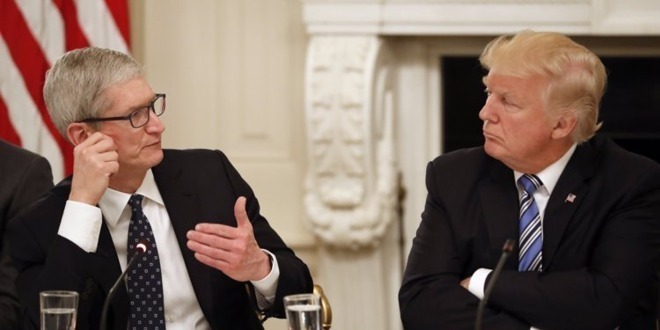Fears of a pending iPhone import tax were assuaged on Thursday as President Trump signed a limited trade deal with China that draws back existing tariffs and cancels a new round of levies set to go into effect on Sunday.
Trump inked a so-called "phase-one" deal that roughly halves current tariff rates and scraps a threatened $160 billion worth of duties on Chinese-made goods including phones and computers, reports The Wall Street Journal.
Today's agreement gives Apple a reprieve. The company was bracing for levies of 15% on its popular iPhone, iPad and MacBook lines, a figure that likely to put a significant dent in Apple's bottom line.
As noted by Wedbush Securities analyst Dan Ives in a note to investors, the tariff round could have added a $150 premium to iPhone if Apple chose to pass the buck to its customers, reports Bloomberg. Ives believes iPhone demand would have decreased between 6% and 8% in 2020 if the company hiked prices in response to the now-dead tariff.
Further, Apple's earnings per share would have dipped by 4% were the company to absorb the cost, Ives estimates.
Apple products like Apple Watch, AirPods, HomePod and Mac parts are currently subject to duties, but that might change as trade tensions ease. Trump said the phase one deal is expected to lead to a phase two agreement dealing with forced-technology transfer, subsidies and Chinese state-owned companies, WSJ reports.
In November, Apple petitioned for tariff waivers on a variety of products on claims that it is unable to source components outside China without hurting its industry position. Those requests covered products already affected by duties, as well as devices previously scheduled to fall under the now-defunct round originally slated for Dec. 15.
Apple has over the past year fought to keep its products out of the imbroglio. CEO Tim Cook has, unlike other industry executives, remained in close contact with Trump. The relationship is thought beneficial to Apple, though critics accuse the company of kowtowing to the White House.
In November, Apple invited Trump and his entourage to tour a Flextronics plant that assembles Mac Pro in Austin, Texas. A highly publicized event, the visit was later used by Trump for political gain.
 Mikey Campbell
Mikey Campbell

-m.jpg)






 Wesley Hilliard
Wesley Hilliard
 Andrew O'Hara
Andrew O'Hara
 Malcolm Owen
Malcolm Owen
 Marko Zivkovic
Marko Zivkovic

 Chip Loder
Chip Loder
 Christine McKee
Christine McKee
 William Gallagher
William Gallagher



-m.jpg)





6 Comments
Good. Of course, anyone that could actually predict movements in stock price over time would be a billionaire. But still, good.
Winning!
What he signed off on was not a finalized deal, but he called off an action he had ordered earlier under special authority Presidents have available.
Any trade deal- usually in the form of a Congressional -Executive Agreement - must pass both Houses of Congress in order to take full effect. The USMCA, for example, has been through the Congress and has been modified and will be acted upon in the House shortly.
Good news for Apple. Whatever one thinks of President Trump, "Tim Apple" ;) is smart to have a relationship with him. Apple is a very progressive company, but under Cook they aren't about to "get woke, go broke." If only the majority of our political and business leaders could have a similar approach. That is, "debate, disagree, argue like hell...but keep talking and remain principled. Find points of agreement and work on them."
As for China and trade, it does seem like there is finally movement over the past few months. I imagine that USMCA being ratified and a coming bilateral trade deal with the U.K. will only increase pressure on China to get something done. Many have been extremely critical of Trump's unorthodox approach to, well, everything. Some have described it as "transactional," which I suppose is accurate. Those that have followed Trump's career (so to speak) are probably not surprised at how he operates. He stakes out a hardline, arguably unreasonable position. He then uses that to negotiate from a position of strength. It's how he's approached everything from trade, to NATO, to North Korea. Obviously, this is not how diplomacy and politics have worked in the past. At the outset, it's a complete shock to the system. He even handles media and PR like this, which I think is the cause of a lot of the outrage. Hopefully the approach will work with China.